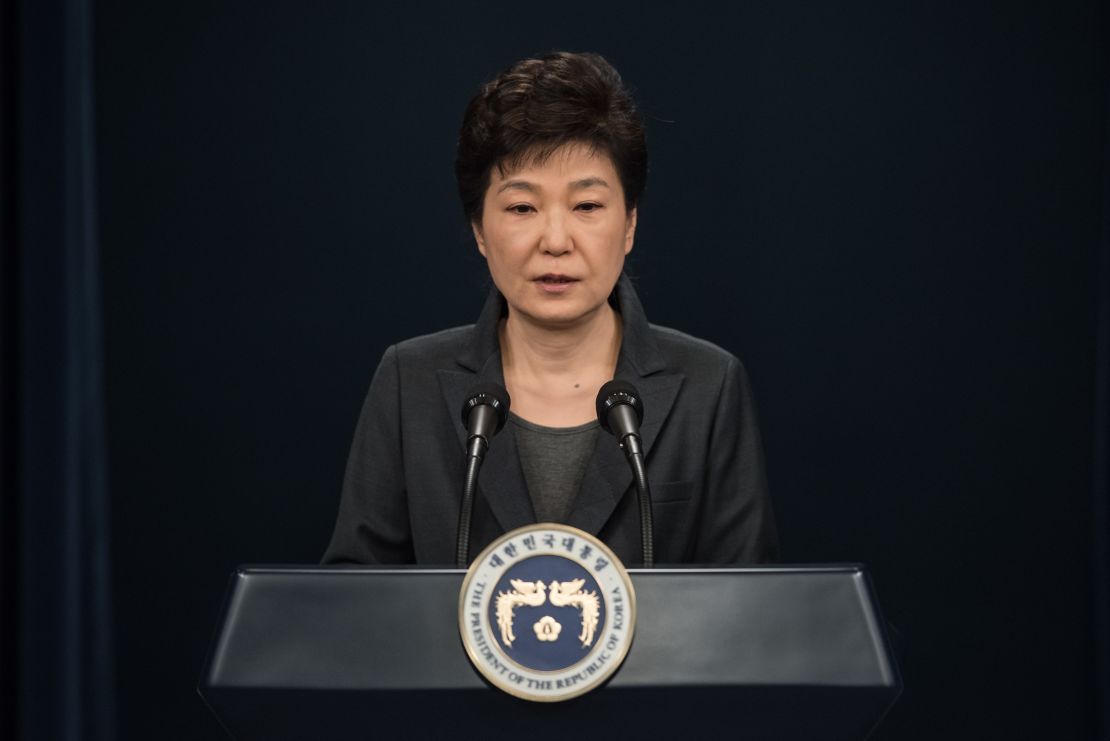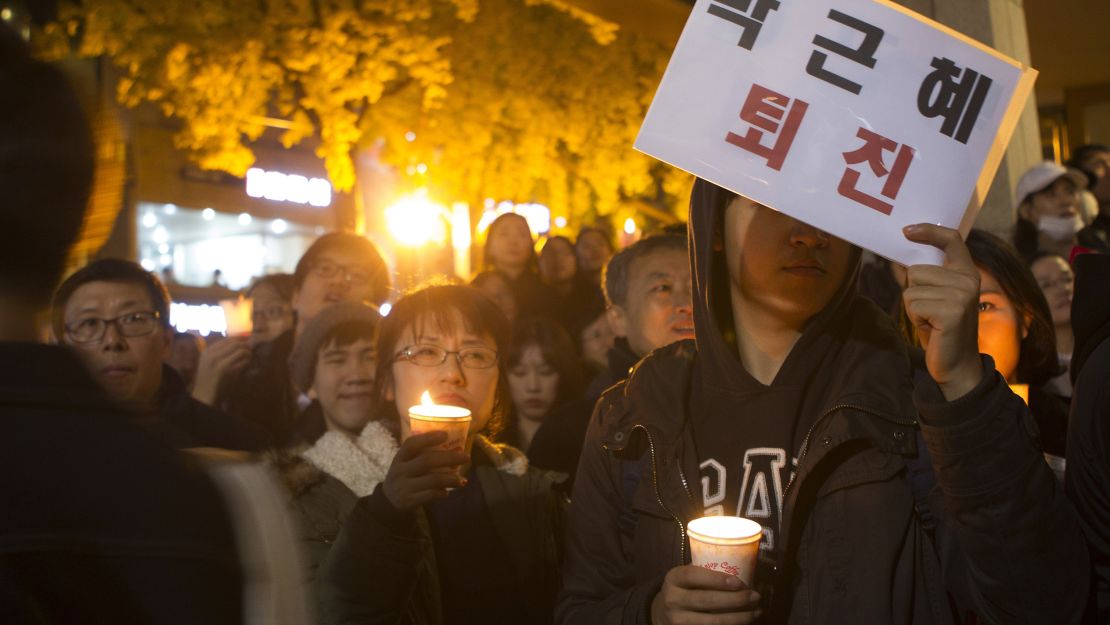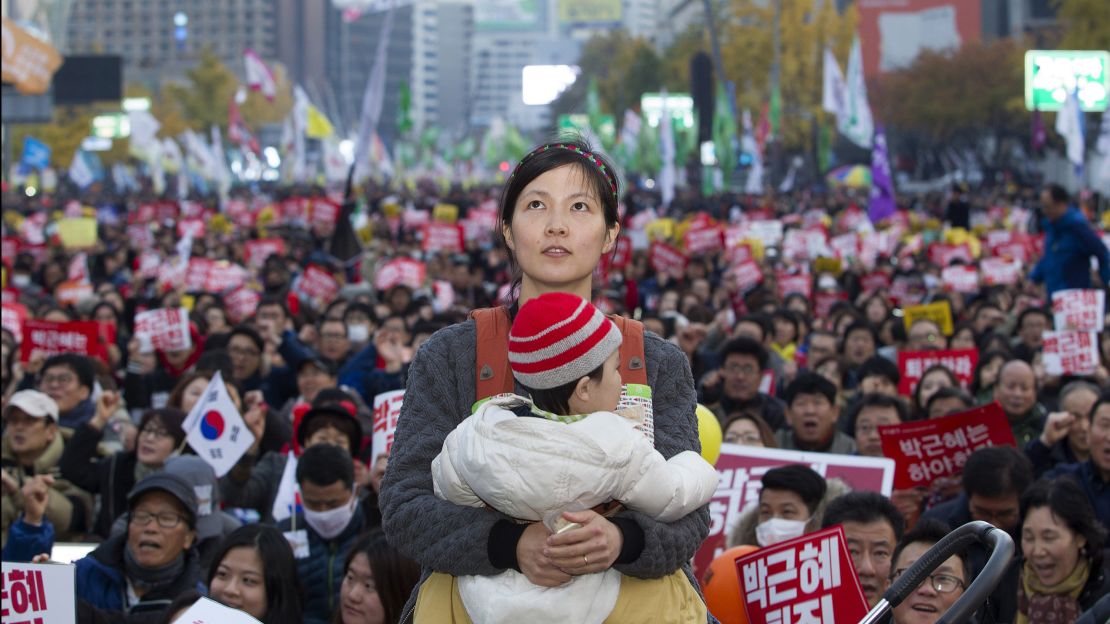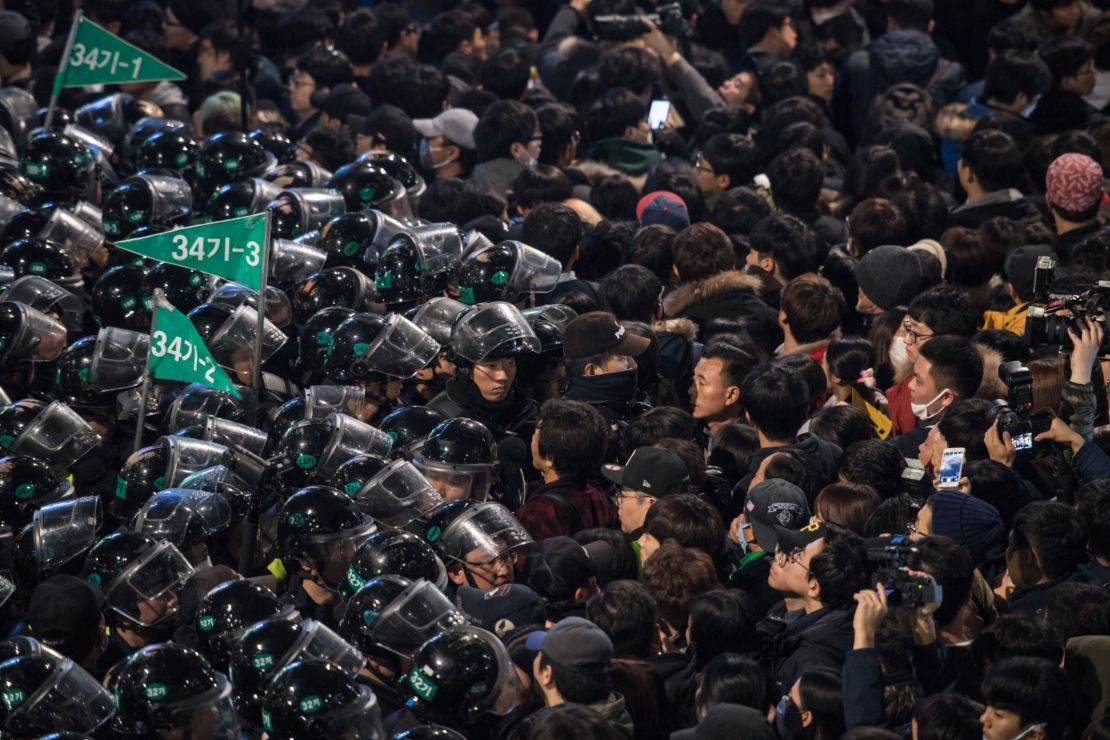Story highlights
It's the second weekend that protesters take over downtown Seoul
Families, students and unions call for the President's resignation
Massive protests roiled Seoul for the second consecutive weekend as hundreds of thousands of angry South Koreans took to the streets Saturday calling for President Park Geun-hye’s resignation.
The march, which included families with young children, students – some in school uniforms – and union members, came as opposition to Park mounts following her unprecedented admission that she shared classified information with someone who lacked the necessary security clearance.
It was one of the biggest anti-government protests the country has seen in decades.
Four officers were injured during the demonstrations, according to South Korea’s Yonhap News Agency, which cited police. Twenty-six protesters were taken to hospital with injuries and a further 29 were treated at the scene of the protests, Yonhap quoted the Fire Department as saying.
It is unclear how the police and protesters were injured.

‘Heard the voices of the people’
In a press briefing Sunday, Park’s spokesman said the President had “heard the voices of the people yesterday with gravity and deeply realizes the seriousness of the current situation.”
“Park is earnestly considering ways to normalize the state of affairs and fulfill her responsibility as President,” he said.
The President has already apologized twice, but that has done little to quell the rage of many South Koreans who say they feel betrayed. Indeed, some protesters are saying the marches won’t stop until she resigns.
Chu Mia, a protester who was wearing devil’s horns and holding a Korean sign saying Park should step down, said, “We don’t want to call her … President anymore. We want a real government.”
She also said South Koreans have been stunned to find that there seems to be “somebody behind her,” referring to Park’s confidante, Choi Soon-sil, who does not hold an official government post, but has allegedly viewed confidential documents and presidential speeches.
“We didn’t give this person the power,” she said.
Everything you need to know about the South Korean presidential scandal
Presidential confidante at root of leak scandal

Media and opposition parties have accused Choi of using her relationship with Park to accumulate millions of dollars in donations to her foundations.
Prosecutors arrested Choi on charges of abuse of power and attempted fraud.
Two of Park’s former aides have also been arrested, according to Yonhap.
A former presidential secretary, An Chong-bum, 57, was arrested on suspicion of abuse of authority and attempted coercion, the outlet reported.
The court issued a warrant to arrest Jeong Ho-seong, the former secretary for private presidential affairs, over allegations of handing over state documents to Choi.
Last weekend, tens of thousands of protesters called for Park to step down, in the process blocking a 16-lane highway in the capital.
Leaders at last weekend’s protests gave speeches between musical performances.
“This sort of corruption happened during her father’s time, but 40 years later, things like this are met with resistance from the public,” one protester told CNN.
Another, holding a candle and with her child beside her, said: “I brought my child so that she could witness democracy in action and also to show her this dark time in our history.”
Park is South Korea’s first female president. She’s also the daughter of Park Chung-hee, the country’s president from 1961 to 1979, who was assassinated by his own intelligence chief.
The late Park is hailed by some as the mastermind behind the country’s current prosperity but criticized by others as a dictator who violated human rights and crushed dissent.

Other issues dogging Park
The classified information scandal, while rare and shocking in South Korea, isn’t the only reason many are calling for her to step down.
There has been growing frustration with Park over the past few years stemming from a number of incidents, including the Sewell ferry sinking, which killed more than 300 people. Many South Koreans were outraged more people couldn’t be saved when the ferry sank.
Unions, in particular, have come out strongly against her.
As one of the protesters, high school student Chi Hee Jung, put it, “She says so many lies and she’s a liar, but we didn’t know that for a long time and now we have to speak loud.”
She added, “She doesn’t feel any guilt right now. That’s why she’s still the leader.”
When asked if Park’s apologies meant anything, she said, “It’s a total lie.”

Pledge to keep up protests
Protesters Saturday attempted to march to the presidential palace, known as the Blue House. It’s less than a mile from the site of the protest, but roads were blocked by police buses and riot police.
Despite the serious nature of the calls for resignation, protesters seemed to be in good spirits. Many brought dogs, and there was live music, again, along with speeches. And they pledged to keep up the protests until they have answers – and a resolution to the current political turmoil.
CNN’s Paula Hancocks wrote and reported from Seoul, and Jeanne Bonner wrote from Atlanta. CNN’s Susannah Cullinane, KJ Kwon and William J. Lee also contributed to this report.

